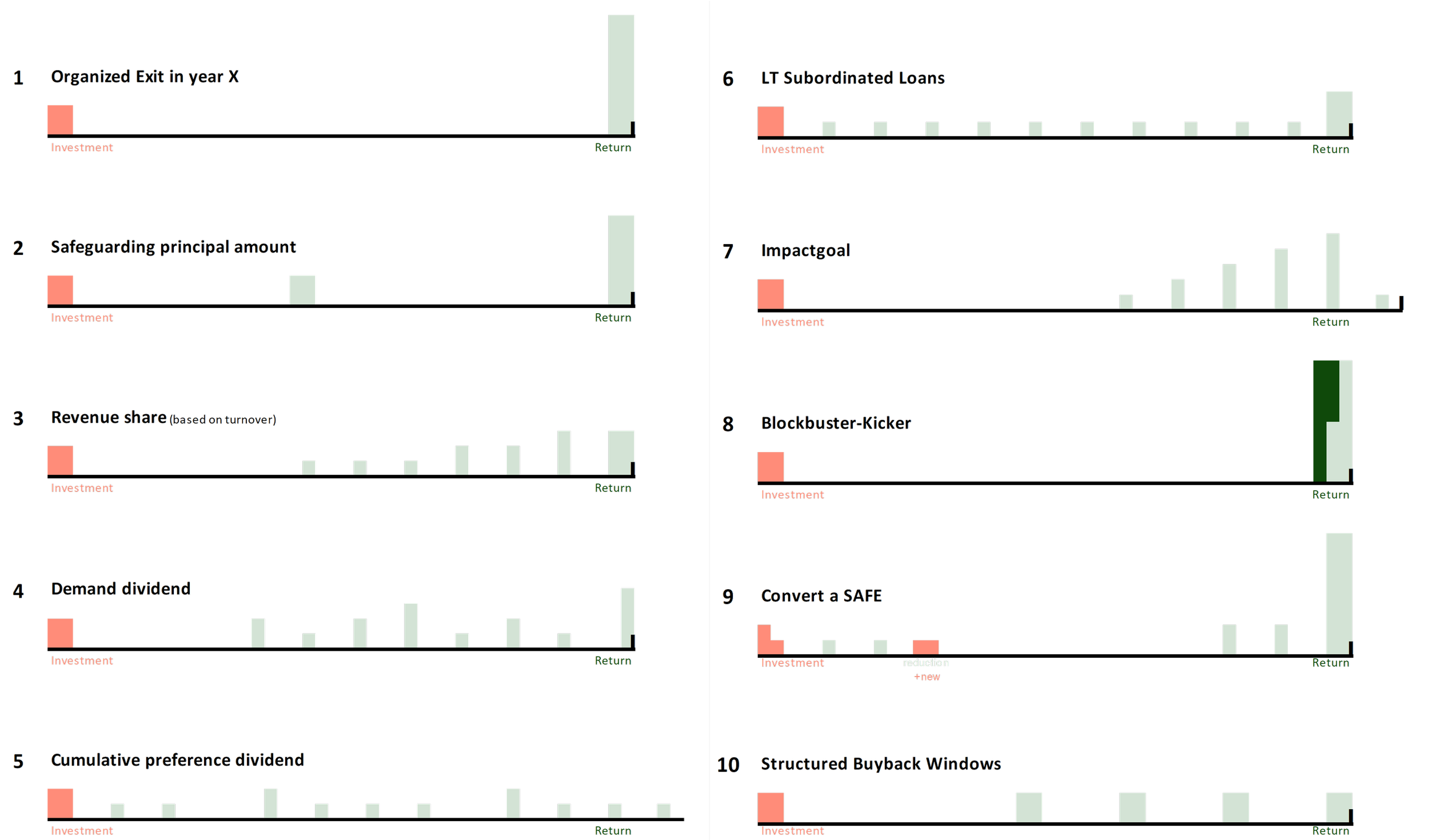Steward-ownership fundamentally challenges what a company is, whom it serves, and why it exists.
That’s why it appears to trigger many impact investors.
Whether you are an entrepreneur, founder, or investor, we advise you on all aspects of steward-ownership and the innovative financing that comes with it.
“Steward-ownership as the ultimate form of impact investing”
The principles of steward-ownership keep a company’s purpose central to its operations. This model ensures that successive generations of stewards carry on the organization’s mission and values, safeguarding its impact. Ownership in these companies represents both accountability and the freedom to determine what’s best for the long-term mission. Such companies are not for sale but are deliberately passed on to capable, value-aligned successors.
"In steward-owned finance, we don’t own the company; we serve it."
Steward-ownership changes how decision-making power is distributed—not by investment or inheritance, but by ability and alignment of values. This model splits decision-making and profit-sharing rights: founders and employees retain decision-making rights, while investors receive greater guarantees over dividends and other returns. This enables the organization to stay focused on fulfilling its mission while still providing returns, liquidity and positive impact for investors.
Growing relevance for investors
Purpose Economy: “As more companies adopt steward-ownership, this model will become increasingly relevant for investors. Therefore, we have to move beyond the WHAT of investing and include HOW investments are structured “
Steward-owned-aligned-financing differs from conventional investment on three levels.
Governance: Entrepreneurial control of the company cannot be treated as a commodity. Investors act as partners at eye level rather than owners.
Liquidity: Through structured investment redemption, liquidity arises from company cash flow or additional financing rounds.
Returns: “How much is enough?” …is a central question. Returns are risk-adjusted yet capped, defined by multiples, timelines, milestones, or other factors.
Conventional equity financing doesn’t fit steward-ownership
Like other companies, steward-owned businesses need capital to grow. However, traditional equity financing often contradicts steward-ownership principles, compromising independence and a mission-centered focus. Steward-owned companies need financing instruments that allow self-determination and uphold the company’s purpose.
When governance, finance and purpose are aligned, the entire potential of a company can be realised.
"Capital should be a tool to serve purpose, not the other way around."
Steward-owned companies need financing that allows investors adequate returns relative to risk, performance and impact, yet without voting rights. Potential returns are based on a fix or flexible cap defined by multiples, timelines, or milestones. Often, a “redemption waterfall” directs a portion of profits toward investor returns until their cap is met, allowing profits to fully support the company’s purpose from that point forward.
Since decision-making rights remain with the company, it’s logical for investors to have clear guarantees on returns. Many steward-ownership agreements combine a redemption waterfall with “hard” milestones like profit targets, revenue, timeline-based goals, or impact metrics to balance the company’s interests with investor rights. Open dialogue and clear expectations are essential in designing these innovative financing solutions.
Steward-owned financing is highly tailormade as the future path to liquidity is more clearly defined. This customization can result in layered financing structures —as in the example shown here— or in simpler agreements that specify the multiple, repayment year, and any associated penalties.
"Delivering high returns in a short time-frame always makes it harder for a company to fulfill its purpose, and to deliver the impact that made us invest in the first place. Balancing our expectation of a fair return with the needs of the company is the key to achieving social and environmental impact as well as sustainable dividends."
Alexander Kühl - Co-Founder, Purpose Evergreen Capital
Strengthening investor rights
Since traditional, unpredictable exit scenarios with uncapped returns aren’t possible, investors in steward-owned companies require greater guarantees on returns and liquidity. Although they lack voting rights, investors can have strong information rights, consultation and even veto rights on specific decisions, such as significant company investments. These rights ensure investors are informed, can contribute strategically, and that the company benefits from their experience.
Innovative financing
Because steward-ownership is an innovative structure, financing for these companies also tends to be innovative. Common forms of financing include:
Non-voting redeemable preferred equity
Equity-like debt, such as convertible subordinated loans
Profit-sharing certificates
Leveraged buyouts
Cash share buybacks with a put-option or “redemption right”
Cumulative preference dividends
Transfers to other steward-owned companies
The patterns and relationships between investment and return can take many different forms:
Cases such as Wildplastic, Stapelstein, or Vyld are great examples of how Steward-Owned-Alligned-Finance can work in practice.
"It was a good first step to shift investments toward ESG and impact. But to align my investments with my values, I also need to examine the investment structure of the companies I support."
Kai Viehof, Impact Investor
Looking for steward-owned investment opportunities?
We support forward-thinking entrepreneurs in finding financing for their steward-owned companies, partnering with investors who believe that a company’s mission should remain central.
There is a growing number of investors who want to learn about or try out financing in steward-ownership. A few years back there came Purpose Ventures and Purpose Evergreen Capital, but in the meantime more and more investors are finding their way. First in countries such as Germany, the Netherlands and Switzerland that have been at the forefront, but interest is also growing in Belgium.
Want to learn why steward-ownership is often called “the ultimate form of impact investing”?
Get in touch.
We are your Belgian point of contact for all things steward-ownership.
How we can help you:
Ask a question in the monthly open call
Every first Tuesday of the month at 1 PM the Belgian Steward-owned team is available to answer all your questions. No registration needed.
Explore your fit with steward-ownership in a 1to1 meeting
Considering a steward-owned enterprise or investment? We take time to listen to your story and needs. Lets figure out how we can help you. Happy to be your guide
Bring this concept to the public. We love invitations.
During a keynote or workshop, we will guide you through the unique world of steward-ownership. Discover why this is a crucial building block to shift the economy.









